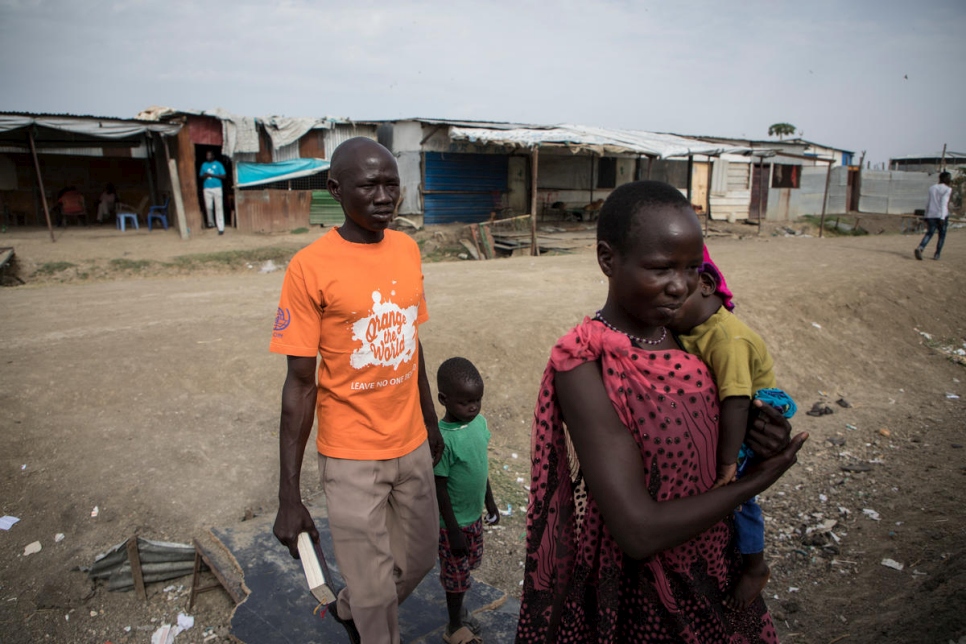James remembers every detail of his escape. The night was pitch black. He pushed his bicycle loaded with the family’s belongings.
His wife, holding on to their three young children, walked alongside. It was early 2014 and fighting in the garrison town of Malakal, South Sudan’s second largest city, had raged for days.
Drunk soldiers attacked men, women and children. Homes were ransacked. Women were raped. Bodies lay untouched where they had fallen.
Four years later, James, now 32, can still feel the sense of fear.
“We spent two days without water.”
He fled to the safety of the United Nations Protection of Civilians’ (POC) site, a few kilometres from Malakal, where he received basic rations and plastic sheeting.
“We spent two days without water,” James recalls. “The children cried. It was very hot. I did not know how to help my family.”
The Malakal POC, established in December 2013, hosts 24,000 civilians in an overcrowded, treeless town made of tarpaulins and corrugated iron.
Temperatures rise as high as 43 degrees Celsius. Streets are made of packed, tan-coloured earth that turns into a sea of mud during the rainy season. The POC site is surrounded by high earth embankments and concertina wire.

James was overwhelmed with anxiety after fleeing Malakal with his wife and three children. © UNHCR/Will Swanson
UN peacekeepers man watchtowers and gates. It may be a safe haven but for many it is also a voluntary prison. Standing on the embankment, James can see his home town on the east bank of the White Nile.
Since 2014, Malakal has been overrun by opposing armies at least 12 times. If he goes back, James knows he risks being arrested, enlisted or killed.
In the months after his arrival, James was overwhelmed with anxiety. Like many South Sudanese, his family had been torn apart by the civil war. A sister was unreachable in Juba, three brothers had joined the military and another had been arrested. Stranded in the POC, he could not find a job.
“My mother started to drink more and more, and she kept on asking me for money,” he said. “But I couldn’t even feed my family. I quarrelled with my wife. She wasn’t happy. She moved out.
“I started blaming myself and I drank. I was arrested for fighting then beaten up and thrown in jail. I was so lonely. That’s when I decided to kill myself.”
"I was so lonely."
In his one-room shack, James, who had been drinking heavily that day, attempted suicide. He was rescued by a friend, who, worried about James’ state of mind, lived with him for a month. Another friend lent him money to start a small carpentry business. He stopped drinking and was reconciled with his wife.
James’s suicide attempt is part of a larger crisis, not only in the Malakal POC but across the country. Mental health experts believe the negative effect of South Sudan’s conflict on civilians’ mental health has been staggering. However, 2 million people have fled to neighboring countries and 1.9 million have been internally displaced, so there are no reliable official data. UN peacekeepers shelter more than 202,000 people in six POCs.
In 2016, the United Nations and its humanitarian partners began collecting data in Malakal POC and identified four suicide cases. In 2017 there were 31 suicide attempts, many around the Christmas holidays in December.
Fifteen were female and 16 male, and most were in their 20s. So far in 2018, there have been 23 attempts, but by May, only one person, a 40-year-old man, had committed suicide. The POC clinic has two psychiatrists.
“Suicide is just the tip of the iceberg."
“Suicide is just the tip of the iceberg,” said Dmytro Nersisian, a psychologist from the International Organization for Migration (IOM). “It’s how people deal with their stresses and their suffering. It’s cumulative distress.”
The horrors of the civil war are just one of many contributing factors. Many people feel rootless and struggle to regain their lost identity, which is magnified by depression and anxiety. Men cannot support their families. Childhood ends early and the future is clouded by uncertainty. Home-made alcohol is easily available, which adds to violence and domestic abuse.
UNHCR and its humanitarian partners are developing a joint action plan to help prevent suicides by detecting those at risk and building referral systems. It is acknowledged that physical protection is not enough and there is a need to help create livelihoods.
“People should also be able to live in dignity,” said Koen Sevenants, another psychologist. “But mental health is not something you install and it’s up and running. To restore dignity will take time.”
An awareness campaign entitled 'Operation Hope' focuses on how people can change how they live and view their lives. The radio station Nile FM broadcasts a mix of Arabic pop and Congolese beats interspersed with positive messages. Football competitions and traditional dance performances are used to publicize ways of coping with problems. The aim is to stimulate young people and make them more resilient.
Four years after attempting suicide, James speaks of how to master day-to-day survival skills. He is a leader in his church and the main actor in an outdoor weekly drama group where he performs as an unemployed husband with an angry wife and debts. A friend helps him get a job. After the performance the actors join the crowd to ask them about what they have learned.
“The message is to be patient,” James said. “Patience is the key to solving all problems. But you should not try and solve your problems alone. Always share them with the people in the community.”
